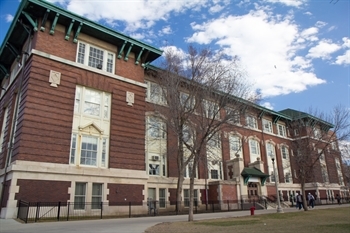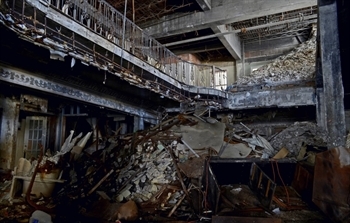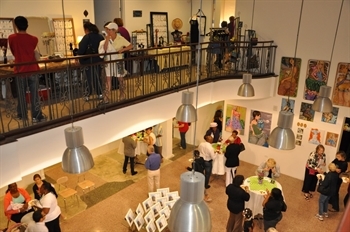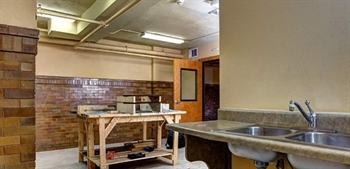
Metropolitan Planning Council
Our panelists discussed successful rehab of institutional buildings at our event.
 By Breann Gala and MPC Research Assistant Zoe Chapin
By Breann Gala and MPC Research Assistant Zoe Chapin - October 7, 2014
In the wake of more than 50 school closures in Chicago, the retooling of unused institutional spaces is as urgent as ever. Last Thursday, Oct. 2, the Metropolitan Planning Council (MPC) was thrilled to host a roundtable discussion, “Reimagine: Transforming Vacant Institutional Buildings,” which included presentations from three panelists with experience rejuvenating vacant buildings into community mainstays. The panelists, Sarah White of Artspace, Debbie Dixon of Gorman & Company and Margaret Haywood of Inspiration Corporation, shared their insights, lessons and successes with more than 70 attendees.
Vacancy tends to contribute to falling property values and further tears at the community’s fabric by increasing crime. Moreover, the vacancy of institutional buildings that once presided as anchors of the community is an immeasurable threat to the vitality of a neighborhood. Redeveloping these sites can restore community pride and well-being while generating positive spin-off effects for residents and businesses. However, while vacant institutional buildings present an immense opportunity to improve communities, they simultaneously present particular challenges.

Stewart School in Uptown is one of the schools shuttered last year across Chicago.
MPC’s Marisa Novara led the discussion with a review of MPC’s recent community engagement work to reimagine a new use for the Stewart School in Uptown. The school was one of the 50 closed in Chicago, and the community is eager to see it functioning again—either as a school or as a mixture of other uses. However, historic preservation of such large buildings can cost an incredible amount of money. Furthermore, the community’s attachment to the building makes its rehab a politically contentious and emotionally charged discussion. With the Stewart School, MPC’s aim was to accurately relay to the Alderman and others what the community wanted to see the school become. This effort—the Corridor Development Initiative—delivered a report on the community’s visions for the space to 46th Ward Alderman James Cappleman, which the Alderman is now using to shape future proposals for the site.

Before Artspace's renovation, the Karcher Hotel in Waukegan, Ill., had fallen into disrepair.
Artspace
Whatever the roadblocks may be in redeveloping historic institutions in a community, the benefits are worth the efforts, Sarah White of Minneapolis-based Artspace explained. Her organization works to increase affordable housing for artists by revitalizing unused schools, warehouses, and even hotels. In the northern Illinois city of Waukegan, Artspace converted the historic nine-story Karcher Hotel, which had been vacant since a 1984 fire, into 36 units of affordable housing. To fund the $15 million dollar project, which included the costly removal of asbestos and lead paint, Artspace used a wide variety of private, public and community financing sources, including the Low-Income Housing Tax Credit and Historic Preservation Tax Credits. Sarah also explained that community involvement and support, in this case the Waukegan Arts Council, was key to the project’s long-term success. Despite a tumultuous construction process, Artspace successfully rejuvenated a cultural asset in Waukegan’s downtown district that many community members now call home.

Artspace's renovation of the Karcher Hotel into Karcher Lofts transformed the building.
Artspace
Debbie Dixon of Gorman & Company, a property management firm, further underscored the urgent need for transformational projects: “We cannot let vacancy erode and eat these communities.” During her time at Gorman, Debbie has been instrumental in revamping vacant schools throughout the region into quality housing. In describing the redevelopment of Moline High School in Moline, Ill., and Jackie Robinson Middle School in Milwaukee, Wisc., Debbie stressed the importance of context and cultural awareness. She noted that it is crucial to “give yourself an education of the people and history of the site.” In the case of Jackie Robinson Middle School, that meant incorporating symbolic murals in the common areas of this thriving, 68-unit affordable housing development. In the case of Moline High School, Gorman helped turn around a neighborhood that had been in decline since the last graduating class left the school vacant in 1958. Gorman & Company converted the school into an amenity-rich housing development for artists complete with a kiln, dark room and wood carving tables. Projects like these, Debbie says, are crucial to galvanizing community engagement and catalyzing further development.

Gorman & Company's rehabilitation of Moline High School provided work rooms for the artists who live and work there.
Gorman & Company
Margaret Haywood of Inspiration Corporation, which provides resources for the homeless, brought a distinct perspective on the process of redeveloping vacant space. Her experience converting an old Garfield Park warehouse at 3504 W. Lake St. into Inspiration Kitchens, a restaurant and workforce development center, was her first development venture, and proved to be an enlightening experience. Although Inspiration Corporation is not a developer, they partnered with IFF, a Community Development Finance Institution, to obtain the necessary development and financing expertise, and recommended other community groups to seek external expertise when tackling large redevelopment projects. What’s more, Inspiration Corporation took into account what the space meant for families in the community. Margaret partnered with a Garfield Park community organization to help build support and relationships in the neighborhood, noting that: “We were aware we were a Northside organization going into a Westside area.” Inspiration Corporation sought community involvement to bridge the gap between the neighborhood’s needs and the project’s intent. Experiences like Margaret’s show that community organizations can successfully redevelop vacant spaces into thriving businesses that provide services to residents and serve as anchors in the community.

Inspiration Corporation's Garfield Park dining room, before and after the transformation.
Inspiration Corporation
“The pie is limited and historic redevelopment costs a lot of money,” said Sarah White of Artspace, underlining the sacrifices that often have to be made in the redevelopment of historic institutional buildings. It’s crucial to garner the political will necessary to secure funding for this type of redevelopment. Given that tradeoffs are an inevitable part of the process, the political and community leadership should create avenues for local residents and stakeholders to voice their concerns and priorities and to grapple with the tradeoffs. As we learned quickly with MPC’s Corridor Development Initiative (see the extensive plans laid out in this final report), community members have a large stake, and likewise a large role to play in the success of places like the Stewart School. These schools and other such institutional buildings are pivotal in creating neighborhood stabilization and change given their high-visibility, central locations in neighborhoods. They present incredible opportunities for a community, and should be handled with care.